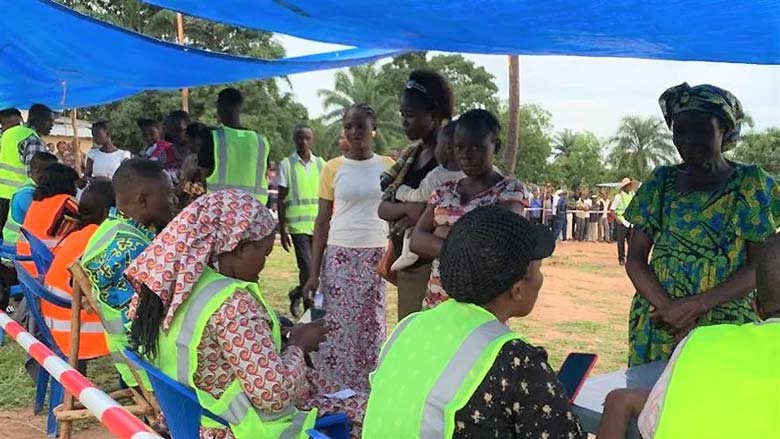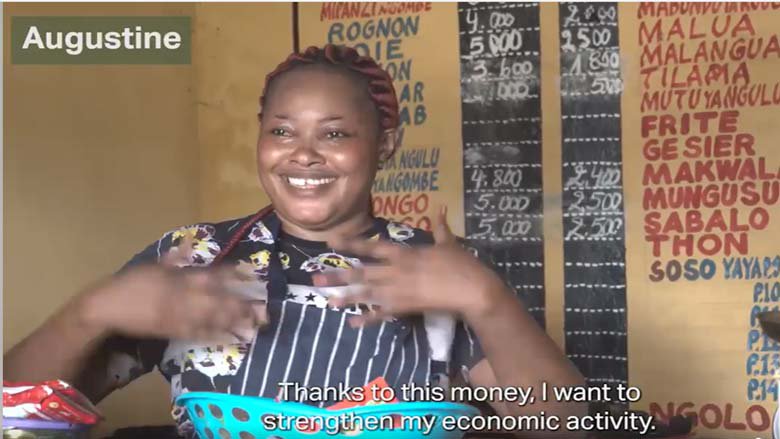Beneficiaries
Augustine is a beneficiary of the Projet pour la Stabilisation de l’Est de la RDC pour la Paix, STEP in Kinshasa, or STEP-KIN. She runs a small shop in a vulnerable neighborhood. The city’s COVID-19 lockdown in April 2020 had a devastating socio-economic impact on vulnerable households, particularly on informal workers with no social protection coverage. With inflation at 16.6 percent in 2020, Kinshasa was the city hit the hardest by the economic effects of the pandemic in the DRC. This threatened to increase poverty in the capital by 7 percent.
“Thanks to this money, I want to strengthen my economic activity. I want to pay rent on my shop. Receiving this sum for six months makes me very happy! I’ve never received such help from anyone before.”
Challenge
Reducing poverty is a challenge in the DRC. At the time STEP was initiated, over two-thirds of the population lived below the international poverty line, the country ranked in the bottom tier of the Human Development Index, 20 million people needed humanitarian assistance, and five million were internally displaced. Today, despite the presence of the largest peacekeeping mission in the world, parts of the country have continued to be disrupted by violent armed groups. The scale of destruction and the challenge of access have complicated the provision of basic public services. Amid this, the COVID-19 pandemic took a heavy toll on the country’s economy and negatively impacted people’s livelihoods.
Approach
The project aimed to improve access to livelihoods and socio-economic infrastructure in selected vulnerable communities in DRC. Following the World Bank Group’s Fragility (FCV) Strategy’s key tenets, which call for remaining engaged during crises and helping countries transition out of fragility, the World Bank has supported the DRC government through financing, technical assistance, and convening power.
STEP is an integral part of these efforts and acts as the main social protection instrument against DRC’s overlapping and repeated crises. The project focuses on (i) expanding social safety nets through unconditional cash transfers and cash-for-work programs designed to build the most vulnerable people’s resilience to shocks, and (ii) developing a national social protection system. Through the years, the approach has evolved from its initial focus on economic recovery to a more systematic strategy for building human capital, along with a new emphasis on refugee-hosting areas and COVID-affected communities.
In addition, key innovations of the STEP program include: (i) the development of a real-time, remote project supervision system (called MARTA, for Monitoring Automated for Real Time Analysis), and (ii) addressing the lack of a social registry, through the use of satellite imagery and mobile phone data to quickly identify beneficiaries for an emergency cash transfer program to vulnerable populations affected by the COVID-19 pandemic in Kinshasa (“STEP KIN”).
Results
At the policy level, STEP has directly contributed to:
- The second pillar of the WBG’s COVID-19 Crisis Response Approach, by specifically protecting poor and vulnerable people.
- The Africa Human Capital Project, for which DRC is an early adopter, by boosting investment in people and protecting already achieved development gains from COVID-19 setbacks.
- Creating development opportunities for refugees and host communities via the Global Compact on Refugees and the IDA Window for Host Communities and Refugees.
The consolidation of social protection interventions in preparation for the forthcoming WBG’s fiscal year 2022–2026 Country Partnership Framework for DRC.
Outcomes of the project between February 2014 and December 2022 include:
- Improved access to livelihoods for 530,000 beneficiaries (of whom more than 200,000 are women) through cash transfers, cash-for-work, and other safety net activities, including STEP KIN, disbursing more than $93 million overall.
- Upgraded 2,185 community infrastructures such as schools and clinics, through 950 community-driven development programs and 1,235 public work schemes.
- Focused these activities on 1,166 vulnerable communities previously affected by Ebola, that are currently hosting refugees or are in conflict-affected areas. STEP investments have benefited 5.8 million people in these communities, of whom 3 million are women.
Bank Group Contribution
The project has benefited from $824 million in IDA resources, $79 million from the initial project and a cumulative $745 million from three additional financing operations. In addition, the project has leveraged $1.2 million in trust fund resources with a focus on community engagement in emergencies, specifically: $700,000 from the State and Peacebuilding Trust Fund, $300,000 from the Rapid Social Response Trust Fund, $200,000 from the Human Rights and Development Trust Fund, and $50,000 from the Early Learning Partnership Trust Fund.
Partners
STEP is implemented by the DRC’s Social Fund (Fonds Social de la République Démocratique du Congo, FSRDC), in partnership with the Ministry of Social Affairs (MINAS) and the National Commission for Refugees (CNR). The work is implemented in close collaboration with local and international partners, including the United Nations Children’s Fund (UNICEF), United Nations High Commissioner for Refugees (UNHCR), and the United Nations Organization Stabilization Mission in the DRC (MONUSCO). The project’s institutional setup, which anchors the policy agenda in a sectoral ministry while delegating the execution of safety nets to a technical public agency, has allowed balance between a long-term agenda on policies and systems and the efficient delivery of results on the ground.
Looking Ahead
The vision is for STEP to evolve from a single donor-funded project to a multi-donor/government-funded national safety net system. Thus, important efforts are underway to strengthen donor coordination, while providing technical assistance and capacity-building to MINAS and FSRDC so that DRC’s government can develop the building blocks of a national safety net.
Drawing on the lessons learned from STEP KIN, the project is currently analyzing how to expand digital cash transfers to the rest of DRC.
Given the country context, there is growing interest in building on the lessons learned from STEP and more systematically developing adaptive safety net programs that can quickly respond to varying and overlapping types of shocks.

